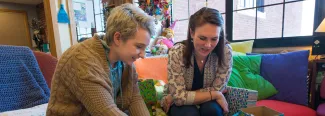
Greetings from the Interim Director
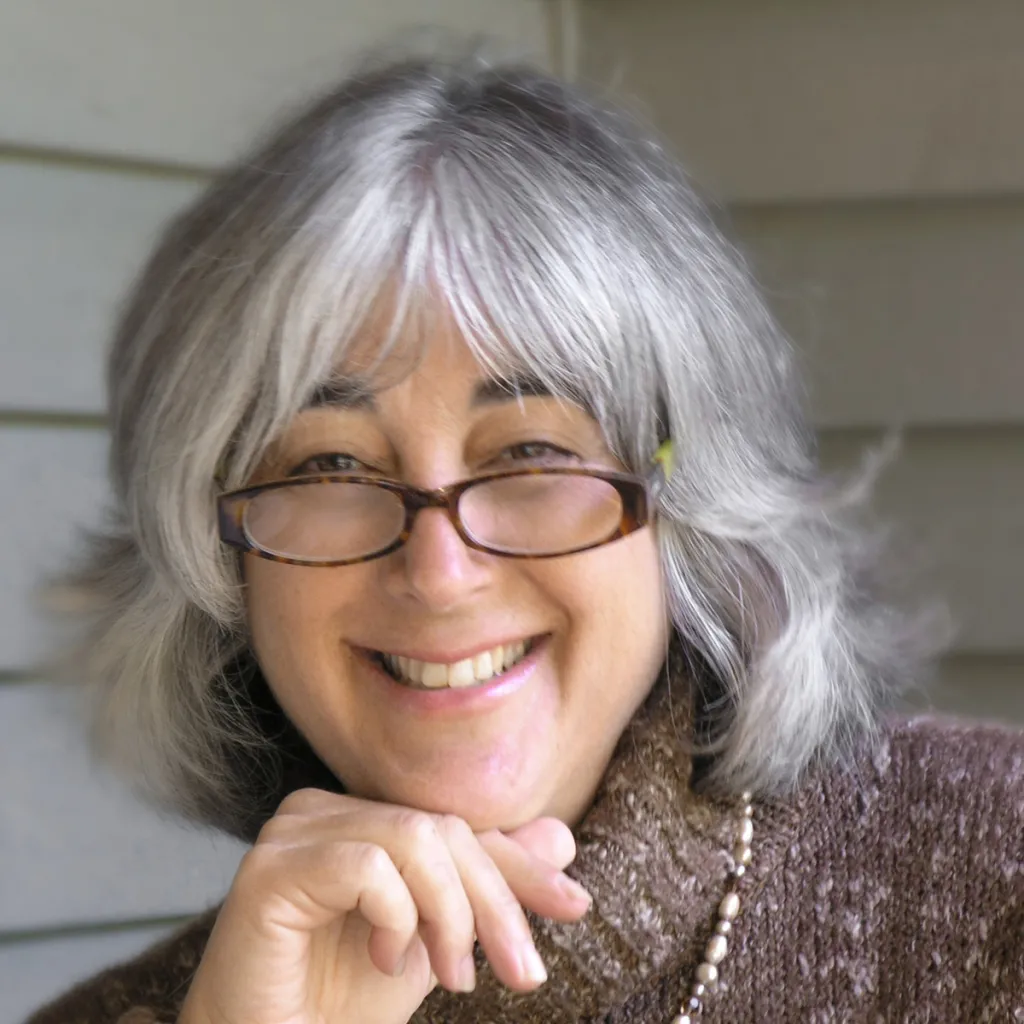
ON THE TOPIC OF "THANK YOU"
I don’t know about you, but I’ve noticed that the art of expressing thankfulness, once an interactive gesture of appreciation and acknowledgment, has changed significantly in the last decade or so. Here are a few of my observations:
1.) No one says “you’re welcome” (de nada; de rien; adaa mudan) when someone says “thank you” (muchas gracias; merci; mahadsanid). Instead, common “thank you” responses might run the gamut of “no problem,” “sure,” or “you betcha” if you happen to be in Minnesota or South Dakota. Or silence.
2.) When you say “thank you” or verbalize appreciation to a colleague, friend, or family member it’s likely to be met with “no big deal," “you don’t have to thank me,” or some sort of dismissal indicating that thanks or compliments are unwarranted — or even uncomfortable.
3.) Lastly, articulating thankfulness is seen as tacky or worse, “kumbayaish” — an artifact of hippie days and grandparents who still wear Birkenstocks with socks in the winter.
Perhaps it’s the lost hour of light that has intensified my peevish reflections. But others agree with me — that we’ve somehow misplaced or replaced "thank you" with, well, nothing. Lisa Gache, co-founder of Beverly Hills Manners, believes that the disappearance of “thank you” is indicative of a growing casualness in our culture, one that has given way to incivility and rudeness. (See the article: "Please Read this Story, Thank You" by Linton Weeks.)
My musings go in a different direction — it’s not so much the loss of “thank you” that I’m bemoaning, but rather the difficulty one has accepting a "thank you," compliment, or stated appreciation. Has feeling appreciated gone out of style? Or are lifestyles so busy, and expectations so high, that we literally can’t stop to accept gratitude?
I suppose Veterans Day and Thanksgiving have also prompted thoughts about how to express thanks to those who protect us in both small and vast ways. Veterans Day (November 11) celebrates U. S. veterans for their willingness to serve and sacrifice for the common good. Several articles in this month’s newsletter are written by and about veterans helping us better understand their perspectives and experiences. November is also the 26th anniversary of the United Nations Convention on the Rights of the Child (CRC), which aims to ensure children’s and parents’ rights to safety, access and well-being — a treaty that has yet to be ratified by the U. S. government. Kathryn Lowery has contributed a piece this month reminding social workers of the need to advocate for children in our nation as well as across the world.
And of course, November is the start of the holiday season — beginning with the rather controversial holiday of Thanksgiving. I learned in Bon Appétit this month that it was venison, not turkey, eaten at the first Thanksgiving. But that may be just one of the many stories invented to sustain our right to eat until we’re sick and watch football in the middle of the day. Ironically, November is also National Native American month, a time to reflect upon the experiences and contributions of indigenous people throughout the U. S.
I invite you to think about all of the “thank yous" you’ve spoken as well as those you may have received and deflected. For my part, I’m grateful to all of you and to the important work we’re doing to make the world a better place.
Thank you.
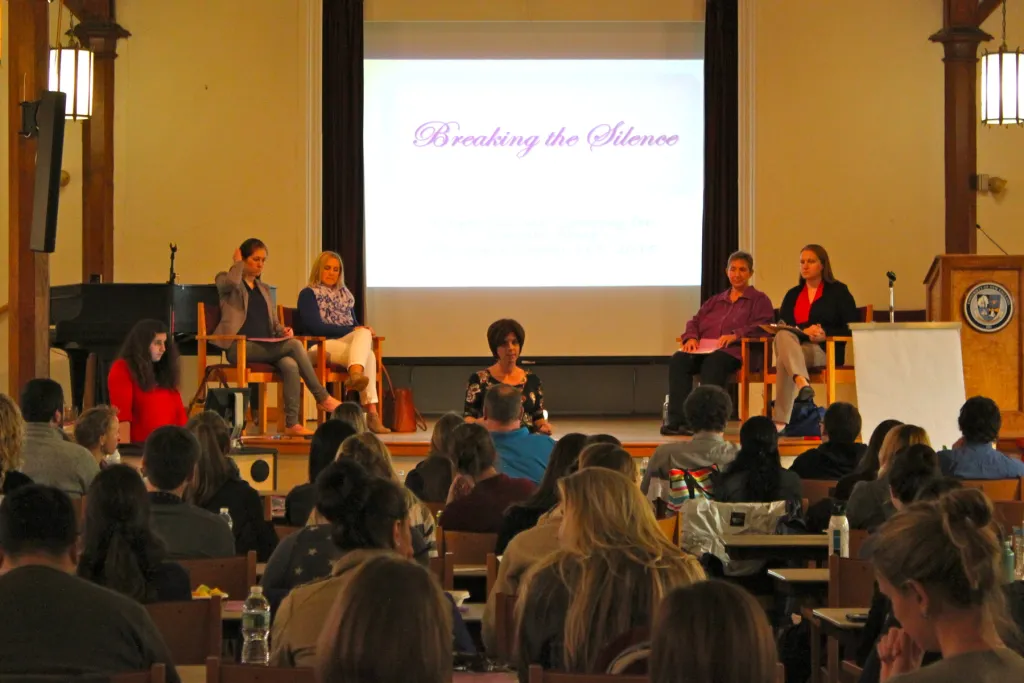
"BREAKING THE SILENCE": STUDENT ORGANIZATION AND IPEC EVENT SUCCESS
On Wednesday October 28, the School of Social Work Student Organization (SSWSO) sponsored "Breaking the Silence," an IPEC event designed to address the importance of screening for domestic violence in all the health professions. Uniquely positioned to provide perhaps the one and only opportunity for victims to reach out for assistance, students from all the health profession programs received screening tools and the opportunity to practice using them in small group settings. Supported by representatives from three county agencies (Family Crisis, Safe Voices and Caring Unlimited) along with our own Amy Coha, the event reached over 100 students. Leading the conversation was student Bridget LaRoche ,supported by several other members of the SSWSO.
STORYTELLING NIGHT
The Applied Arts and Social Justice Certificate recently sponsored an evening of storytelling, “Transforming our Stories of Race,” facilitated by David Hunt on Wednesday, October 21. David is the founder of the Community Building Storytelling Project, a project designed to reintroduce storytelling into American culture as a tool to build community and heal America. David used his version of storytelling to create a sacred space where the voices and visions of all that were gathered could be shared and heard. The event was the culminating event of an independent study on Storytelling for Racial Justice with MSW students Blanca Santiago and Kelly Dell’Aquila and faculty member Lori Power.
Goals for the event were:
- To create a space where people can begin to be less scared of talking about race (breaking down the fear of ignorance).
- To create a safe space where everyone’s voices and visions can be shared and heard.
- To explore the concept of race as a story we can — and must — rewrite.
- To debunk some race myths.
- To provide people with an opportunity to increase, or create, their personal awareness as it relates to race.
- To inspire social action by:
- Providing people with the idea, and opportunity, to begin rewriting their own story of race;
- Providing people with an opportunity to practice telling their race story; and
- Exploring examples of things people can do to address racism personally and collectively using story and storytelling.
The event was a roaring success! Here are a few quotes from students who attended:
“Storytelling night was extremely powerful! Thank you for having us attend. My entire MSW journey has been about challenging myself to go outside of my comfort zone — this experience pushed me once again!”
“David Hunt’s talk confirmed that I am really naïve when it comes to race. I think storytelling is a great way to talk about race. David Hunt presented it in a way that was eye-opening and thought-provoking. It was also interesting to hear people’s stories about race, and be able to tell my own without interruption. I think it’s important for people to continue telling their stories and experiences about race in order to break down the walls that still remain.”
“I loved that we were challenged to stay silent when hearing others' stories — it made me really listen."
“I found myself feeling more comfortable with the topic than I have been in the past.”
“Storytelling night was an experience that really shaped my worldview surrounding race. I enjoyed the speaker’s anecdotes surrounding the power of a story and how stories shape everything, from the personal to politics."
At the end of the evening, participants wrote a resolution of something they would do to use story to address racism in their lives. The resolutions were collected and will be mailed back to participants before next semester, just in time for New Year’s resolutions!
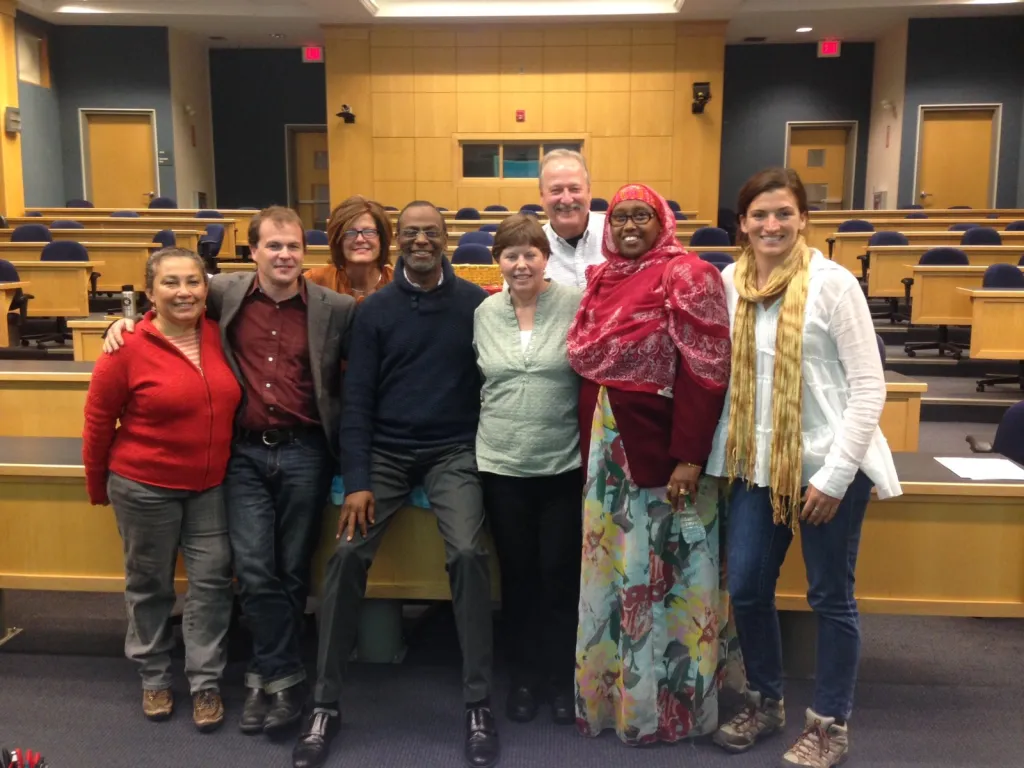
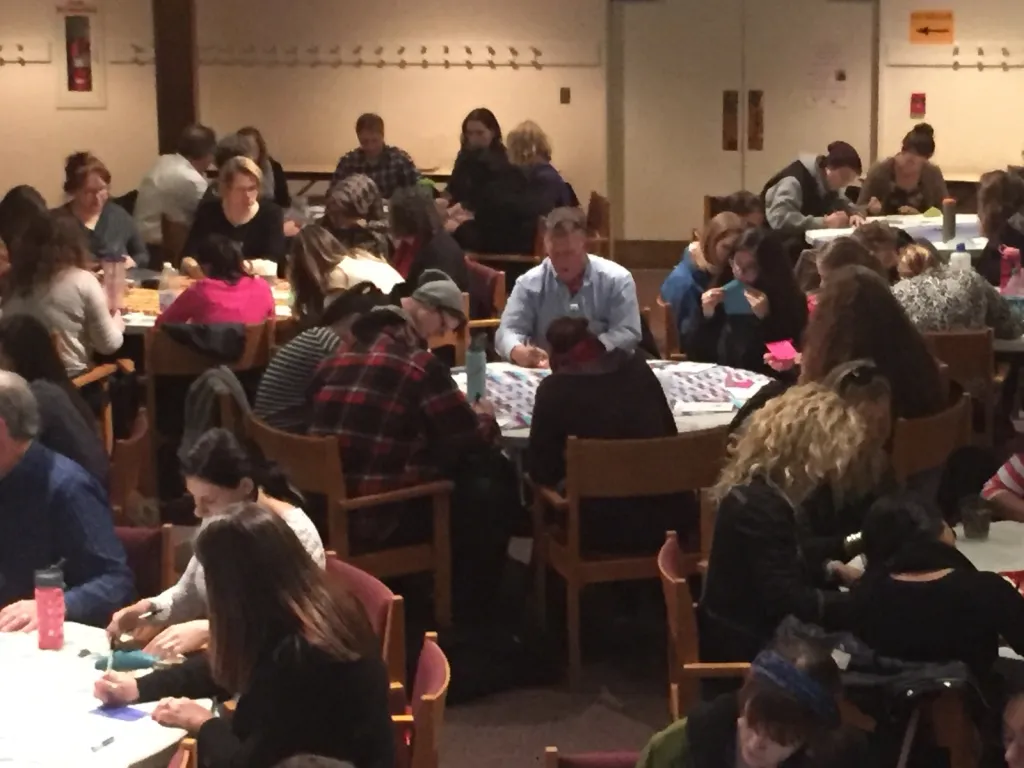
CURRENT STUDENT AND ALUMNUS PRESENTING AT MAINE CONFERENCE
The School of Social Work always has good reasons to be proud of its students and alumni. This month Nicole Thibodeau (MSW candidate, 2016) and Tookie Bright, (SSW Alumnus, 2010) are presenting at the conference, "From ACEs to Resilience: Promising Practices from Thriving Communities," sponsored by the Maine Resilience Building Network. Tookie is presenting about Space to Breathe, which is a five-day summer adventure program designed for teenage caregivers, ages 12-18, who have a parent or a sibling living with cancer. Nicole’s poster session highlights the work done on her Capstone project titled "Evaluating Observations of Parents Whose Children Attended Space to Breathe Wilderness Adventure Therapy Program: Resiliency Research Informing Effective Programs." This project looked at the elements of the Space to Breathe adventure-based wilderness program and how the challenge model of resiliency theory works to promote internal and external resources for adolescents impacted by their parents' or siblings' cancer diagnosis. The conference features Dr. Rob Anda, ACEs co-principal investigator, and other notables in the fields of research and resilience.
FACULTY PRESENTS RESEARCH
Professor Nancy Shore recently presented, alongside colleague Paige Castro-Reyes, their paper “Research Ethics Reconsidered in the Context of Community-Engaged Research” at the American Public Health Association Conference in Chicago. Congratulations to Nancy and her team!
Student Spotlight
CAROLEE 'JESSIE' TUSTIN, MSW CANDIDATE '16
Jessie's current Field Placement: is at the New Hampshire Veterans’ Home, working as an Admissions Social Worker and Intergenerational Program Administrator.
1. How would you describe your future social work practice?
I am a veteran myself, so this is an extra rewarding endeavor for me. I see my future as a social worker, working with veterans along several different spectrums. My goal is to help improve the quality of life and functioning with the LGBT veterans. I would also enjoy the opportunity to work with female veterans. I foresee working with different organizations to make this possible. I also intend to maintain a connection with the veterans of the geriatric population.
2. What is the most unexpected thing you have learned so far as a student at the UNE SSW?
I have learned that Maine has a much more robust amount of social services to provide to the veterans in the southern part of Maine. I had no idea how much the New Hampshire veterans were missing out on until I started doing my research for my Capstone project. I am still uncovering programs that I would like to see replicated in New Hampshire. I hope to share this knowledge with my colleagues to see what we can accomplish.
3. What has been the most rewarding part of your field placement so far?
My field placement has provided me the opportunity to learn what it is like to perform cognitive assessments in a home setting. I’m also learning what it is like to create an engaging and rewarding intergenerational program with teenagers and elderly.
4. What has been the most challenging part of your field placement so far?
Time-management is the most challenging part of my field placement. It feels like there are not enough hours in the day to get what I need done in the time I have allotted.
5. How do you foresee yourself impacting the social work profession during your future career as an MSW?
My intention is to provide a valuable voice for the LGBT, women and all veterans in my community and state. I am very interested in the macro level of social work, but I feel strongly that I need a solid micro and mezzo level of practice to be a strong advocate.
RATIFYING THE CONVENTION ON THE RIGHTS OF A CHILD
by Kathryn Lowery, MSW Candidate '16
November 20 marks the 26th anniversary of the United Nations Convention on the Rights of the Child (CRC). The CRC’s aim is to promote children’s rights around the world. Specifically, it asks nations to protect children’s rights to survive and to be safe from abuse, exploitation and neglect. It emphasizes the need for all children, including those with disabilities, to have access to educational, health care and legal resources. One hundred and ninety-three nations have ratified the CRC. Parties not yet to sign are the United States, South Sudan and Somalia.
The United States played an active role in drafting the Convention — so why are we yet to ratify it as a nation? Since coming into effect on September 2, 1990, Presidents Clinton and Bush failed to submit the article to the Senate. President Obama had indicated intent to submit, but as of November 2015 there is no date set.
Misconceptions about the impact of the CRC on individual rights and state and federal laws have stalled its ratification. In many respects, legislators believe that children’s rights are already well protected by U. S. law. Others perceive the CRC as stepping on parents’ freedoms granting children greater rights than their caregivers. Although the CRC explicitly protects parents/parenting from government interference, this perception has been a significant barrier to the CRC’s ratification. One bright light is that the U. S. enforces the CRC’s prohibition of child sex trafficking.
By not supporting and ratifying the CRC, the U. S. is taking a stand not to join with other nations to make visible the needs and rights of all children. I invite you to learn more about the CRC and its aims. The Children’s Rights Campaign has information and resources about ratification and offers insight on the effects of implementation. The website includes a petition urging the Obama Administration to submit the treaty to the Senate as a first step to raise awareness about children’s needs and toward future ratification. I urge you to consider signing.
Past examples of CRC outcomes:
- In East African refugee camps, orphans no longer have to depend on a friendly adult to get fed.
- In Senegal, Niger and Egypt village elders now postpone marriages for child brides in favor or education.
- Teens previously forced into prostitution are put into rehabilitation rather that prison.
MARSHALL ARCHER, MSW CANDIDATE '16
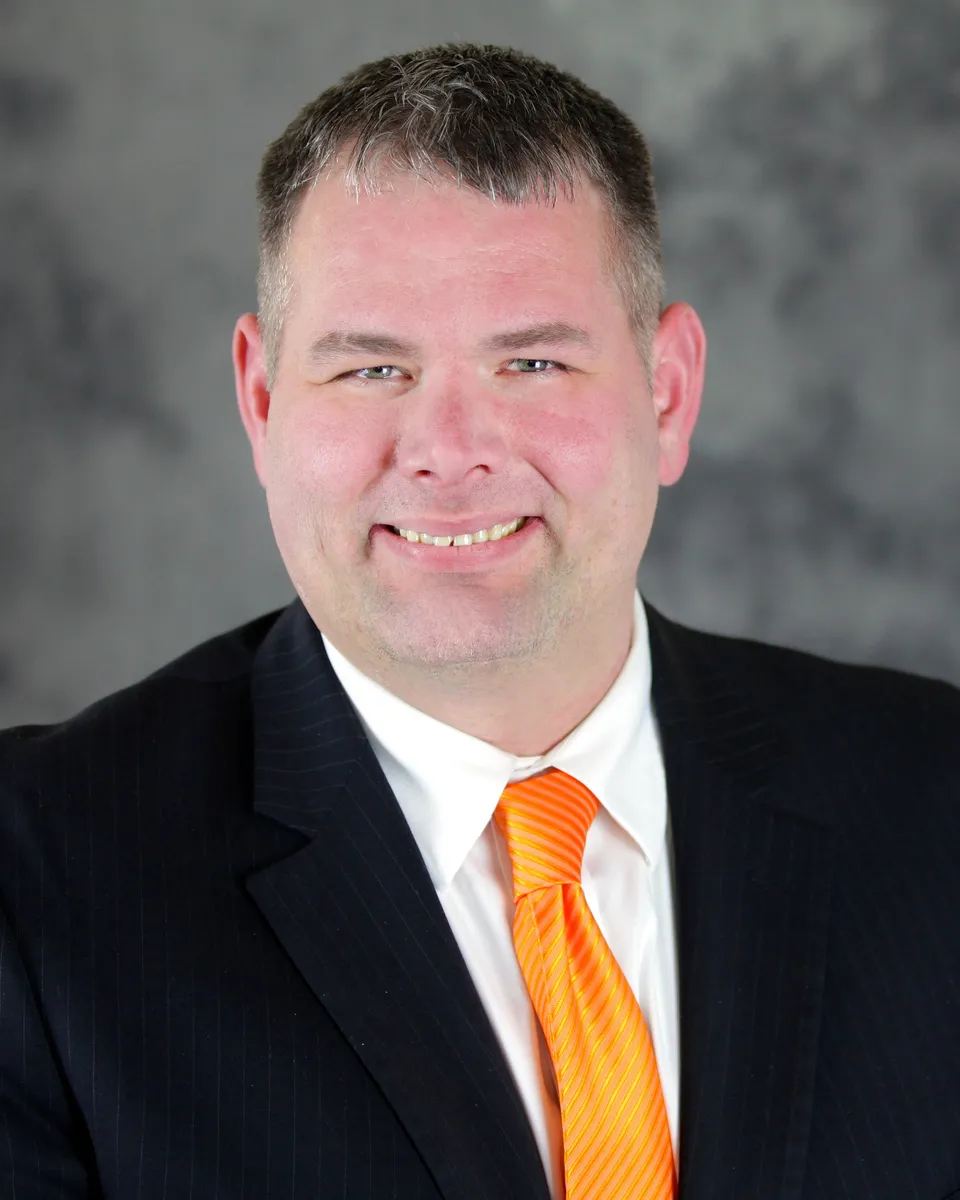
Marshall served in the U.S. Marines from 2001 to 2005; he deployed to Iraq twice and provided security support in the Anbar Province. While attaining his Bachelors of Social Work, Marshall assisted in the creation of a Veteran Student Organization and a Veterans Resource Center at the University of Southern Maine. In 2009, Marshall's efforts led to the creation of L.D 1488, a law that provided Maine's Veterans complimentary access to Maine's State Parks. In addition, he has served as the Regional Director of Student Veterans of America, served on the Veterans of Foreign Wars Current Conflict committee, advising the National Commander on various Iraq and Afghanistan issues, and served as a member of the VFWs Department of Maine Council of Administration. Marshall most recently served as the Veterans and Compliance Officer for the City of Portland, Maine where he assisted homeless and at-risk veterans in maintaining long term stable housing. He has assisted many veterans obtain VA healthcare, compensation, pension, education and various other benefits that are available.We’d like to acknowledge Marshall Archer — a current student in our campus program — for his service, his dedication to veterans throughout his social work practice, as well as some recent accomplishments.
Marshall’s dedication to civic engagement and advocacy will continue to flourish once he graduates from the UNE School of Social Work. He has recently been accepted into a Doctorate of Social Work Program in Administrative Practice, and he has also been elected to serve as Warden of Ward 7 in Saco, Maine. Congratulations on your many accomplishments, Marshall, and thank you for all that you have done and will continue to do for our country!
Alumni Spotlight
DARRYL VINCENT (MSW '13), CERTIFIED SUBSTANCE ABUSE COUNSELOR, COO OF U.S. VETS
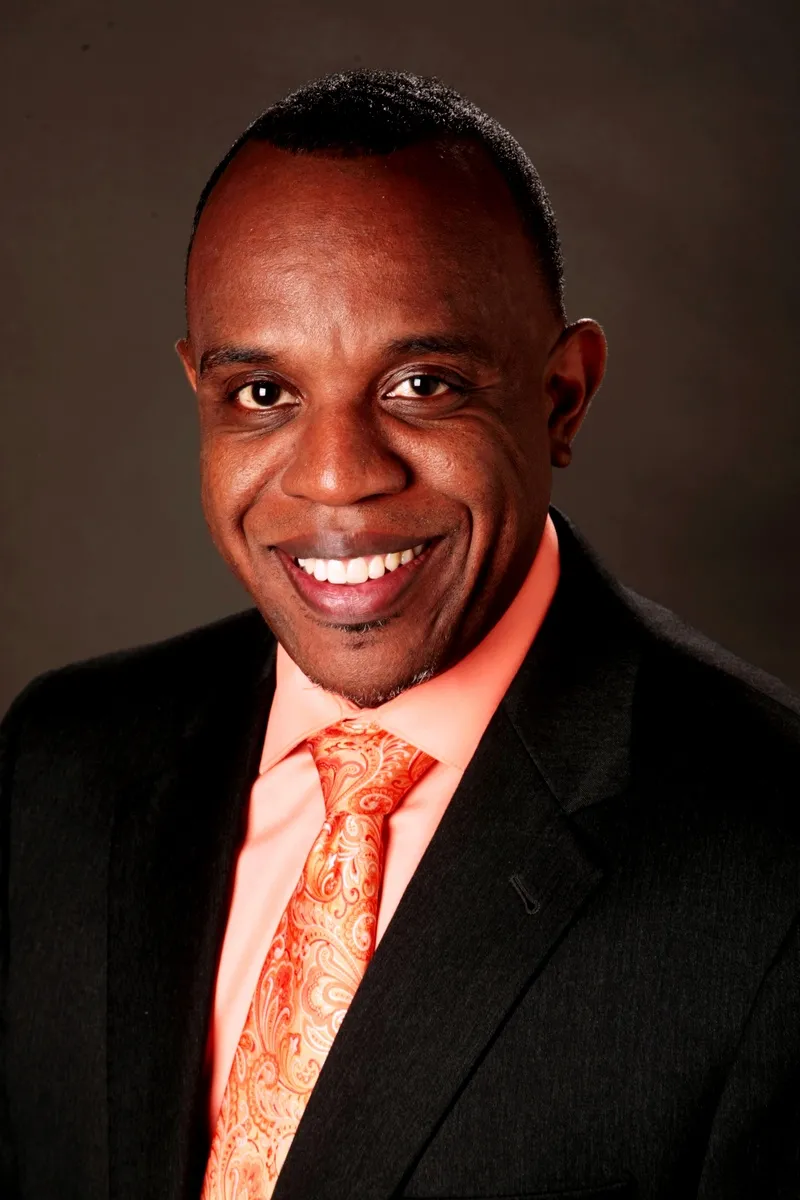
1. How would you describe your social work practice?
I am currently the Chief Operating Officer of U.S.VETS, the largest non-profit service provider to homeless veterans in the nation with 11 locations in 6 states as well as Washington D.C. and the island of Guam. Over 4,000 veterans reside in our locations on any given night. As COO, I oversee 11 Executive Directors and the national Clinical Team to ensure they are aligned with national standards and best practices. My social work practice is more macro in nature. I am involved in advocacy and policy making in the state where I reside (Hawaii) and with national efforts that deal directly with veterans services.
2. What from your education at UNE SSW do you continue to utilize in your practice today?
The education I received from UNE SSW has been vital in my practice today. As a direct result of my studies, I, along with the national clinical team, implemented in our organization a Theory of Practice and Theory for Practice that is not only posted at each location but also followed by our staff. I, along with the national clinical team, implemented formal clinical supervision for all direct service staff. I belong, participate and lead local advocacy groups that work in the community to instigate change. All these endeavors are a direct result of my education at UNE and I utilize that education daily.
3. What has been the most rewarding project that you’ve been involved in lately?
The most rewarding project I have been involved with lately was reconfiguring transitional programs into all 11 of our sites with a more client-centered approach versus program-centered. Our programs had traditionally set schedules, classes, rules and guidelines that applied to all clients. As the clients' needs and barriers changed and the housing-first approach emerged, I was able to work with our clinical team at a scheduled conference. The sole purpose of the two-and-a-half day conference was to develop a new service delivery for our transitional program so that it was more individualized for our clients. The main reason for this change was because we felt it was almost criminal to do business in 2015 the same way we did in 1993.
We were now seeing more chronically homeless veterans and younger veterans from current conflict; and our more structured environment did not fit what they needed in order to make the change that they were seeking. In the past, we had a structured treatment approach for all; and while this was still productive for some, it was not for all. In the past, our relapse policy was zero tolerance in a quest to keep the communal environment drug-free. In addition, clients were required to go to a certain amount of classes per week, which was a mandate that could not be directly tied to the program's primary goal of moving to Permanent Housing (PH). Lastly, there were a plethora of rules in the program that are necessary in a communal environment, but left no flexibility to adjust for those veterans that could not — or would not — conform to such rules.
It became clear that we needed to adjust our programs so that we give the least amount of services in the least amount of time in order to produce the best outcome per the client’s desires. Transitional Housing (TH) was not being funded at same level, PH placement goal for Housing and Urban Development (HUD) went from 65% to 80%, and TH had to change to be more of a bridge housing with lower barriers of access and more tolerance for missteps as they progress through the program.
What happened along the way was interesting and insightful. The Clinical Directors from across the country met and we discussed what changes needed to be done and why. Needless to say, not all agreed; we have a mixture of PsyD, Dr., MSW, MFT, substance abuse counselors, etc., and everyone had different beliefs in how to treat relapse, run a program, and yet be client-centered. As the facilitator, I kept the dialogue open so that all could be heard, but I was also conscious that we needed consensus and a plan before we left this conference. I noticed along the way that many people are deeply tied to their school of thought; and remembering my education with UNE SSW, it is important to recognize how others receive and give things, so my job is not to change that but present in a manner that makes sense so they can come to their own conclusion — and even if we don’t agree, the decision is an informed one.
The result was agreeing that we would treat relapse clinically and it did not result in immediate discharge. The Clinical Director would work with the client on the relapse in the hopes of reducing, if not eliminating, use if this was congruent with the client’s goals and/or refer to a more appropriate setting based on the client's desires and needs. We changed our "treatment plans" to "housing plans" as language dictates culture, this name-change made a big difference in shifting the mindset. Lastly, we developed new tracks that answered the needs of the veterans in our transitional program with lower barriers for veterans to access our program. The new tracks allowed for clients to pursue their goals — not the program goals.
We developed a step-by-step process for each site to follow, to implement all of the aforementioned, and to report back to me on progress until it was complete. This process outlined the steps of making this change by first including and soliciting feedback from the veterans in the program, all staff, our funders, partners and community before we implemented any of the proposed changes. We adjusted what we developed at the conference based off their feedback and developed a timeline for each location for implementation. We allowed some of the guideless to be altered for cultural differences given we have locations as far east as DC and as far west as Hawaii. This process took more than one year and, as of today, all locations have successfully made the programmatic change and it has been embraced by the community. Each site followed this process with success!
All of this took an approval from the Department of Veteran Affairs (VA) and an official grant modification. VA buy-in at local and national level was not only crucial, but needed. Consequently, the VA recognized how this change was made and we were afforded the opportunity to present our new model of service delivery at the Annual National Coalition of Homeless Veterans Conference with the goal that other organizations serving homeless veterans could see an alternative effective approach.
This project allowed me to use many of the teachings I obtained from UNE SSW program such as: cultural competency and sensitivity, using evidence-based practices in our service delivery, making change WITH the clients versus “TO OR FOR” the clients, effectively working and facilitating groups when there are differing opinions, and practicing a strength-based approach in our methods of delivery.
4. How do you see your current work impacting our society and the future of social work?
The work we do has a direct impact on society, as we are working towards ending veteran homeless by the end of this year. We are measured as a society by how we treat the ones who need us the most. A veteran who served their country, who is now living on the same streets he or she was once asked to defend is a dishonor to all of us in this country. While there will always be a need to have a safety net for those who find themselves in need of support, we should have the system in place to identify veterans and have the resources to meet their needs. That is how we ensure homelessness can end or, at a minimum, be very brief for a person.
Prevention services, Housing First, permanent subsidy with continuing services, affordable housing, using existing transitional beds for bridge beds to a permanent placement, job training, connecting to benefits, and HOPE are just a few of the effective strategies used to attack veteran homelessness. The approaches used with veterans can now model the approach to use to end homelessness for all as well.
The future of social work is impacted by showing that when there is a shared problem, there is shared solution — because it does not just fall on one portion of our society to solve our society’s challenges; it is each of our responsibilities. And while we do have different roles, no role is more important than the other — just different in its duties. Therefore, we should never dismiss a good idea just because it didn't originate from us. We should be more invested in getting it right than being right. This means the government, nonprofit, private sector, community and the homeless population themselves all have equal investment and responsibility in solving this issue. That investment looks different for all, but it is equally important and needed. The quest to end veteran homelessness brought all these entities together; and while it was not always an easy collaboration, staying focused on the shared goal allowed most of us to see that the only differences we have is in the “how.” We all want the same outcome.
Our current work hopefully will induce the future of social work to be more inclusive of addressing issues from a strength-based shared approach. No one sector can do it alone; and it is not our goal to change people’s beliefs, but to maximize what they can do to help the cause. Our job at U.S.VETS is to work ourselves out of job and to make sure the words "homelessness" and "veteran" can no longer be placed in the same sentence.
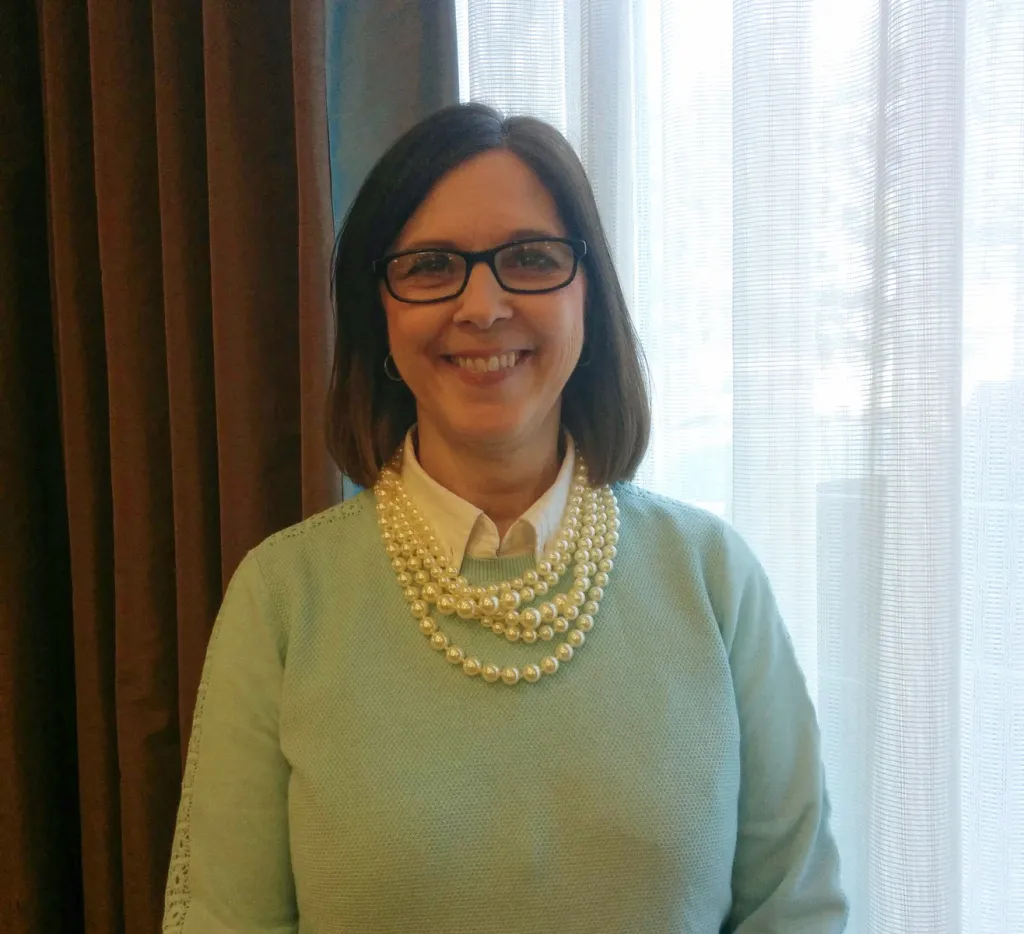
Wanda Anderson, LCSW, Clinical Associate Professor and Coordinator of Online Field Education
Wanda has been a social worker for nearly 30 years. She served in the Army in the mid-80's and discharged as a disabled Vet. She trained as a MCCEO (Multi-Channel Communications Equipment Operator) and was stationed in Fort Jackson, S.C. and Fort Gordon, Georgia. She attended 5 undergraduate colleges to earn her first degree in Psychology. She then obtained her MSW degree from the University of Hawaii in 1990. After traveling and living in South Carolina, Georgia, Hawaii and Nevada, she returned to Maine. She has since practiced in Portland, Augusta and Northern Maine. She has worked as an administrator, supervisor, clinician and advocate. Her early work was with women and children, survivors of sexual abuse, and convicted sexual offenders. Her career focus has been on issues around poverty and survivors. She has presented extensively over the past several years on social work ethics, specifically rural ethics.
1. How would you describe your social work practice?
I begin my social work practice from a humane place. Social work is a calling and my goal is to work each and everyday to change the world, just a little bit. I know that sounds grandiose BUT REALLY that is why I became a Social Worker — to leave the world a better place. I was trained in the 80’s in a deficit-based Social Work model and soon found my new comfort in a shift to a strength-based, client-centered practice. What I have learned the longer I do this work is: the more I learn, the less I know. I learn more everyday from students and clients than I believe they will ever learn from me. I practice from a stance that the client leads and I am along to support their journey. If we believe in the power of change, then the goals, the ideas, the pace and the change must generate from the client.
2. What is your favorite course to teach at UNE?
Every course I teach or every training I offer will be my favorite that day! Having said that, my greatest passion is in teaching the field seminar courses. I especially love to teach SSW 582, the final field course of the MSW program. I have the honor of working with students in their final 32 weeks of the MSW program. I am able to hear from students about how this program and their journey have transformed their lives. I use Skype and VSEE and see and talk to my students on a regular basis. I will meet with field instructors in India, Alaska and Arizona all in the same day! Online teaching has brought the world into my office and, thus, my values and ideas are challenged on a daily basis. How great is that!?
3. What has been the most rewarding project that you’ve been involved in lately?
So I am coming full circle in that, 20 years ago, I was a part of a grass root’s collaborative in my community to support and assist struggling youth. As life became busier, I left the collaborative. This collaborative has continued and I recently re-engaged and am working to be a part of this group as they transform to take on issues of generational poverty. Generational poverty is a subject near and dear to my heart, as I do not feel we have tackled this tough issue of breaking the cycle of generational poverty in this country and, more specifically, here in my small area of Northern Maine. I am excited to be a part of this group, which involves many local agencies that have joined resources, knowledge and labor to best begin a path to work to eradicate (or even reduce) poverty in our county.
4. How do you see your current work impacting our society and the future of social work?
The UNE MSW program is assisting and training future Social Work graduates across the world. Our program focus on international social work and the vision of health as a human right becomes the foundation of my teaching. UNE and my teaching will help shape the vision and focus of the social workers of tomorrow. I am awed everyday by the power and influence I have in joining, assisting and mentoring our new graduates. I take my role very seriously and strive to provide guidance, compassion and understanding as I interact with the UNE MSW students.
5. What keeps you energized and passionate about social work education and practice?
I came to the UNE MSW program in 2003. I had never envisioned myself working in academia; I loved the practice of social work and the ability to interact daily with clients. When I was approached by UNE, I had no interest in leaving my current career as the supervisor of a case management agency. After a few conversations with UNE, I saw the potential to be a part of a much larger opportunity in training social workers in my local area as well as students from the border area of Canada. I opted to join the MSW faculty in 2003; and after 5 years of teaching in a classroom, I was offered the opportunity to move into the online MSW program. My first thought was, “No, thank you”. Technology was not (and still is not) in my comfort zone. So, having no other options (as the campus program was transitioned to an online format), I moved into the online program kicking and screaming. Now, 8 years later, I would never return to the classroom. I LOVE being a part of the MSW online program option. I get the opportunity to interact with students across the country and even across the world on a daily basis. Teaching in the MSW program has become my greatest passion!!! How great it is to love to go to work each day!
Opportunities & Information for Students
SOCIAL JUSTICE ARTWORK NEEDED!
Do you know of an artist or group whose art has a social justice theme? The art can address such themes as poverty, addiction, environment, gun violence, food security and many others! We need new art for the Hersey fourth floor hallway, and perhaps even the hallway near Parker Pavilion! If you, or an artist or group you know, would like to hang their art for a period of two or three months, please contact Lori Power (207) 221-4493 or lpower@une.edu). Many thanks!
CALL TO ALUMNI: STUDENTS NEED YOUR HELP!
If you have graduated from UNE with your MSW two or more years ago, and are interested in a volunteer opportunity that will enhance your skills as a professional social worker, we need you! Our program is full of amazing students who need Field Instructors for their foundation and advanced field placements. As an alum, you understand the importance of Field Education and the expectations of students in our MSW program. Our field instructors have flexibility in how field instruction is delivered. You may meet with your student by phone, video conference, or face-to-face. If you'd like to provide field instruction to one or more students, please contact Director of Field Education Kelli Fox. Thank you!
CLARION COMPETITION
The UNE Interprofessional Case Competition is held every spring at UNE. It is sponsored by the IPSAT student group. The competition is modeled after the University of Minnesota’s CLARION case competition. Teams composed of four students — with no more than two students representing the same profession on each team — are given a patient case study and must perform a root cause analysis detailing what went wrong in that patient's case. Although the patient case has clinical components, the case combines elements from a variety of health professions, leading up to a sentinel event. The case is written by faculty from the University of Minnesota and shared with all schools competing in the national CLARION competition. The winning UNE team is awarded a $3,000 prize, to be divided by team members. The team then advances to compete on the national level at the University of Minnesota’s CLARION competition. Airfare and lodging in Minnesota are provided by UNE.
WHO CAN PARTICIPATE?
You are eligible to participate if you are a full-time health professions student from UNE's Portland Campus or Biddeford Campus. (This includes online students only if they are able to come to campus in person for meetings and other events.)
Students who are interested in competing should contact ipsat@une.edu
- Students are also welcome to join the Clarion committee. The Clarion committee will assist in planning and hosting the UNE Case Competition. This is a great option for students who are interested in the Clarion, but may not have the time to dedicate to a team.
- Students will be placed into teams of four with at least 2 different programs represented. There isn't a limit to how many teams may participate, but there must be enough students to create full teams of four.
- Participants must complete the IHI certification. The IHI Triple Aim will be held on 11/19 on the Portland Campus.
- Teams are required to attend in-person meetings held by IPSAT regarding the Clarion.
- The amount of time a team puts into their case is depends on the team.
- The winning team will receive a $3,000 prize, to be split amongst the team, and will represent UNE at the national level in Minnesota.
- There is also a monetary prize for teams who place first, second, or third at the national level.
INTERPROFESSIONAL EXPERIENCE COURSE OPPORTUNITY FOR ON-CAMPUS STUDENTS
In spring semester there is an opportunity for social work students to learn together with OT and Nursing students and with older adults living at Park Danforth (right across the street from the UNE Portland Campus). The course (see below) is taught by Nancy MacRae from the OT program and will be offered to SW students as a group independent study (3 credit elective). Students from SW have enjoyed this experience in the past as it provides an opportunity to learn firsthand from and with older adults–those living in an assisted living environment.
OTR 665: Interprofessional Experiences with Older Adults
SNAP (Strategies to Nurture Aging Persons) is a collaboration between the university and Park Danforth, a living site across the street and composed primarily of independently living older adults. Nursing and social work students work with OT students to devise a 6 week program on Aging in Place for those interested older adults living at this site. This course encourages interprofessional collaboration in both devising and implementing a specific program, from start to finish, for older adults, allows the student to learn more about the involved professions, provides options for leadership, and — most importantly — gives the student a chance to get to know older adults and how to help them learn health-facilitating practices to allow them to age in place. It is truly a reciprocally-learning process.
The program is developed the first half of the semester and then runs for 6 weeks, from 1-2 p.m. on Tuesdays, after spring break. The class meets Tuesday afternoons from 1-3 p.m., with the meetings taking place at Park Danforth.
Please contact Nancy MacRae for more information.
STUDENT ORGANIZATION
The UNE School of Social Work Student Organization (SWO) was created as a response to the need for student involvement in the creation and maintenance of policies, procedures and the structure of the University of New England School of Social Work.
The purposes of the organization include:
- Promoting communication, collaboration and community among students, faculty and administration in the UNE School of Social Work.
- Securing and advancing student rights and responsibilities for their education.
- Organizing and uniting the student body in such a manner as to achieve our collective goals and to provide the special needs of individual groups within the student body.
- Enriching our educational experience by providing and allowing for the growth and development of individual skills and interests.
- Participating actively in matters of concern and social justice.
Every student in the SSW is considered a member of this organization. No dues or applications are required. All students are welcome and encouraged to become active members! Whether you join us weekly or just once in the year, we look forward to getting to know you!
Please check out our website for more great information!
Linda M. Piper
MSW Class of 2016
University of New England
UNE MSW HONOR SOCIETY: SIGMA LAMBDA
Interested in Joining the UNE MSW Honor Society Sigma Lambda? We would love to have you as part of our organization! In order to join you need to have a 3.5 GPA and need to have completed one term of classes. You must send an email from your UNE account to Lisa Boris and send your transcripts to Dawn Blake. There is a $30 fee that covers the cost of the certificate and pin and must be paid by cashier’s check or money order only. Once the email, transcripts and money are received, members are added to the UNE MSW Honor Society page quarterly. Please feel free to post any questions on the Interested in Joining the Honor Society Facebook page and we will address them. Honor Society officers are: President Lisa Boris, Vice President Carly Turner, Secretary Dawn Blake and Treasurer Amy Tracy.
STUDENT TOWN HALL MEETINGS INVITATION
Shelley Cohen Konrad, Interim Director of the School of Social Work, is hosting Student Town Halls once a month on the following dates, times and locations. This time is devoted to discussion of a variety of topics. Do you have an issue, a concern or an accomplishment to share? If so, please come meet your classmates, bring an issue or come to listen.
- September 9, 2015 4-5 p.m. in Cahner’s Lounge
- October 21, 2015 4-5 p.m. in Alexander Hall Wing Lounge
- November 11, 2014 4:30-5:30 p.m. in Alexander Hall Wing Lounge
- December 9, 2015 4-5 p.m. in Cahner’s Lounge
Light refreshments will be served.
CAREER/JOB SERVICES FOR STUDENTS AND ALUMNI — A SPECIAL TIP FROM VICKI WALKER
Jobs, careers, work...Whatever you call it, you can find the resources at this UNE webpage for career services:
It's a great resource for part-time work while in school, and also has resources for professional employment after graduation.
There is literally something for everyone at this site. Take a look at the numerous Resources this site provides. There are all kinds of job listings, from part time jobs, government jobs, hospital jobs to regional and international jobs opportunities. Students can take advantage of all sorts of help finding a job. Whether it’s updating your resume to learning how to network, you will find it here. Faculty can find out how the Career Center can collaborate on classroom presentations as well as recruit employers for job fairs.
And speaking of Career Fairs, the Career Center will be hosting a Health Professions Career Fair this February 10, 2016 from 11 a.m.–3 p.m. in the Finley Rec Center. Have the Career Center help you brush up on your resume and make plenty of copies to hand out! Lunch will be served.
Also, the School of Social Work receives Social Work job opportunities every week. We have a 3 ring binder in the office listing all the jobs we receive weekly. These jobs are also forwarded to Jeff Nevers in the Career Center.
Upcoming Events
PHOENIX CHORALE CONCERT FOR SOCIAL JUSTICE
The Phoenix Chorale, Portland's chorus that sings for social justice, is lending its strong voice to raise funds for the Good Shepherd Food Bank with a free concert Saturday, November 21 from 11:30 a.m-12:30 p.m. at Skillins Greenhouses in Falmouth. This pre-Thanksgiving concert features songs about companionship, home, other cultures and the power of change, with music both familiar and new. Donations of food and funds will be accepted at the concert for those less fortunate than we during this very special time of year.
Please join your Phoenix chorale friends and our neighbors to help use the power of music to raise funds for the Food Bank. For more information, visit the Phoenix Chorale's website or find them on Facebook.
WHEN WE CRY FOR JUSTICE, WHAT DO WE REALLY MEAN?
UNE SSW partners Maine Inside Out and the Restorative Justice Project of the Midcoast present a two-day event featuring original performances by Maine Inside Out Participants. Performances are scheduled November 16 and 17. For more information on where and times, please see their website.
